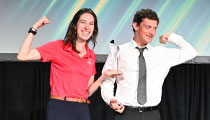Making the Move from Sidelines to Game Time: Becky Oakes
By Lindsey Atkinson, CIC, RAA on July 12, 2017 Students with Disabilities PrintPioneer: a person or group that originates or helps open up a new line of thought or activity or a new method or technical development
: one of the first to settle a territory
Most of us go through life without the opportunity to be one of the firsts at something. The intertwining history of sport and society has produced many opportunities for individuals to be the first or to become pioneers of our history. Many times, these pioneers of society and sport are thought of as highlighted names in our school history books meant to be studied by future generations. The title “pioneer” is not imagined as a designation that can be bestowed upon us for our everyday actions and commitment to daring to do what no one before us has done. It is that commitment to doing what is right that has led Becky Oakes down a path in which she and many others have paved for female athletes, female athletic administrators and for high school student-athletes with physical and cognitive impairments to find room in the game and off the sidelines.
Her pattern of pioneering began in the summer of 1972 with the passage of Title IX. Oakes was eighteen years old and entering her freshman year at Southwest Missouri State University now Missouri State University. As a true pioneer of female athletics, Oakes was one of the first female athletes to receive scholarship money to play softball and field hockey during her four years at SMSU. The pioneers of Title IX were those first female athletes who entered into the male dominated environment of collegiate athletics and persevered in spite of inequalities in facilities, transportation, and funds, to name a few. Though Oakes was never one for sitting on the sidelines, she symbolized the movement of female athletes running from the fields of intramural competition to the fields of scholarship competition.
Competing collegiately led Oakes to a career in education-based athletics—coaching, officiating and eventually administering high school sports and activities. Challenging the norms of inequalities in pay and opportunity became commonplace for Oakes as she moved up the ranks of high school athletic administration. It was in 1992—twenty years after the passage of Title IX—that Oakes took on the role of pioneer in the world of athletics yet again. She was named the executive director of the Missouri High School Activities Association as just the second female executive director in the country. It was game time yet again.
The role of executive director gave Oakes the opportunity to run for the NFHS Board of Directors presidency in 1996. The victory allowed her to become the first female president of the NFHS Board of Directors. One more brick wall knocked down, glass ceiling shattered, sideline crossed as Oakes continued her pioneering efforts in athletic administration.
Pioneering was not the reason behind Oakes’ career and lifetime of accomplishments. It was a byproduct of her fierce passion for pursuing her love and respect of education-based athletics. Her drive to provide all students with the opportunity to participate and her personal experience fighting for the right to participate on the same field, drove Oakes to take on the challenge of providing the same opportunities for students with disabilities. In 2013, Oakes worked with NFHS Executive Director, Bob Gardner and others to make the inclusion of students with disabilities a priority at the national level. She pioneered the cultivation of relationships with organizations working with students with disabilities. She was also instrumental in the development of several educational resources and the creation of “Making the Move from Sidelines to Game Time,” an article series highlighting inclusion efforts across the country.
Oakes’ lifetime of pioneering has opened doors for female athletes, aspiring female administrators and students with both physical and cognitive disabilities. It is impossible for one to calculate the lives changed forever because of Oakes pursuing her passion and leaving a wake of possibilities and open doors. As a result of her efforts, the sidelines are looking pretty bare. Thank you, Becky Oakes, for “Making the Move from Sidelines to Game Time.”







